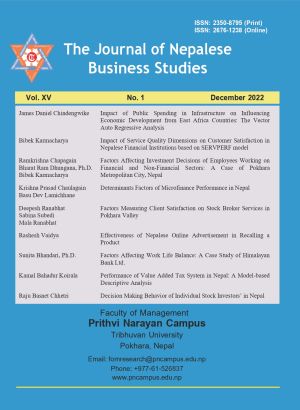Impact of Service Quality Dimensions on Customer Satisfaction in Nepalese Financial Institutions based on SERVPERF Model
DOI:
https://doi.org/10.3126/jnbs.v15i1.50375Keywords:
Confirmatory factor analysis, customer satisfaction, service quality, structural equation modeling, SERVPERF modelAbstract
The banking sector's expansion leading to client happiness is critical for a country's economic development because it contribute to large amount of capital resource for the country. Thus, this research aims to quantify the impact of service quality dimensions on customer satisfaction in Nepalese financial institutions based on SERVPERF (Cronin &Taylor, 1992) model. In this paper, the explained variable is customer satisfaction and the predictor variables are tangibility, reliability, responsiveness, assurance and empathy. Convenience sampling technique was used to select 350 respondents from different financial institution within Pokhara city. The study incorporated structured questionnaire for collecting the information on service quality dimensions and customer satisfaction. The confirmatory factor analysis and structural equation modeling techniques were used to examine the five elements of service quality in regard to customer satisfaction. The result of CFA with fit indices of GFI=0.943, AGFI=0.922, χ2 /df =1.434, RMSEA=0.035, CFI=0.881 and TLI=0.854 advocate that the measurement model has a excellent fit. Following CFA, path analysis was performed that resulted with fit indices GFI=0.938, AGFI=0.918, χ2/df =1.341, RMSEA=0.031,CFI=0.885, TLI=0.862 suggest that the structural model has an excellent fit. Furthermore, path analysis results show that the service quality components of assurance, responsiveness, and reliability are positively and significantly associated with customer satisfaction. This study provides policymakers and senior management in Nepalese financial institutions with practical insights for better understanding all aspects of service quality in order to satisfy their clients and develop their relationships for the organization's long-term sustainability
Downloads
Downloads
Published
How to Cite
Issue
Section
License
Copyright (c) 2022 Journal of Nepalese Business Studies

This work is licensed under a Creative Commons Attribution 4.0 International License.
This license allows reusers to distribute, remix, adapt, and build upon the material in any medium or format, so long as attribution is given to the creator. The license allows for commercial use.




